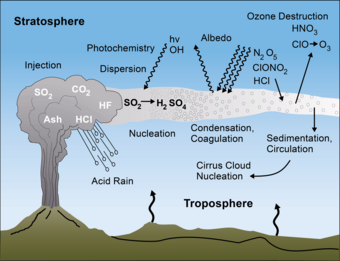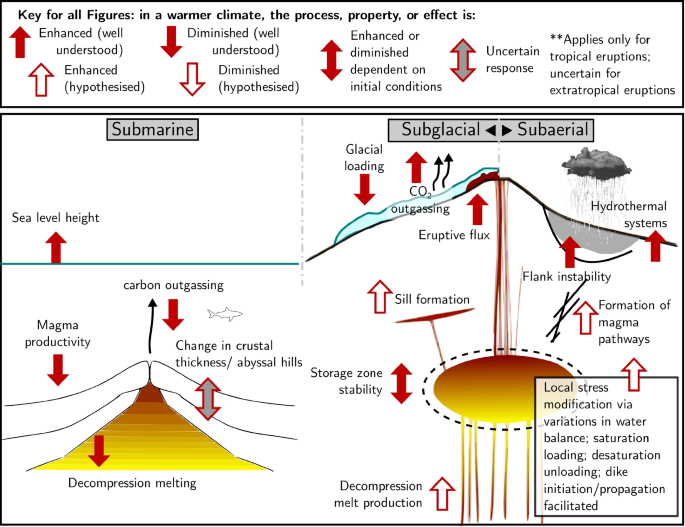Introduction
Volcanoes have long been recognized as powerful natural forces that can shape the Earth’s landscape. However, their influence extends beyond just physical changes. Volcanic eruptions can significantly impact the climate, both locally and globally. In this blog post, we will explore the role of volcanoes in climate change, examining how their emissions of gases and particles can affect the Earth’s atmosphere and contribute to shifts in temperature and weather patterns.
1. Volcanic Eruptions and Greenhouse Gases
When a volcano erupts, it releases a massive amount of gases into the atmosphere. One of the most significant greenhouse gases emitted during volcanic eruptions is carbon dioxide (CO2). These emissions contribute to the greenhouse effect, trapping heat in the Earth’s atmosphere and leading to global warming.
1.1 Volcanic CO2 Emissions

Volcanic CO2 emissions are relatively small compared to human-induced emissions. However, they still play a role in climate change. On average, volcanoes release about 200 million metric tons of CO2 annually, which is only about 1% of human emissions. Nevertheless, volcanic CO2 can have localized impacts on climate and air quality.
1.2 Volcanic Aerosols
Volcanic eruptions also release aerosols, tiny particles that can remain suspended in the atmosphere for months or even years. These aerosols can reflect sunlight back into space, leading to a cooling effect on the Earth’s surface. The most famous example of this is the 1815 eruption of Mount Tambora, which caused the “”Year Without a Summer”” in 1816, resulting in widespread crop failures and famine.
2. Volcanic Effects on Weather Patterns
Volcanic eruptions can have short-term effects on weather patterns, particularly in the region surrounding the volcano. The release of gases and aerosols can alter atmospheric conditions, leading to changes in temperature, precipitation, and wind patterns.
2.1 Volcanic Winter
Large volcanic eruptions can cause a temporary cooling of the Earth’s surface, known as a volcanic winter. The release of aerosols into the atmosphere can block sunlight, leading to a decrease in global temperatures. This cooling effect can last for several years and has been observed after.
Summary
Volcanic eruptions release a variety of gases and particles into the atmosphere, including carbon dioxide, sulfur dioxide, and ash. These emissions can have both short-term and long-term effects on climate. In the short term, volcanic aerosols can reflect sunlight back into space, leading to a cooling effect on the Earth’s surface. However, the release of greenhouse gases like carbon dioxide can contribute to long-term warming. Additionally, volcanic eruptions can trigger other climate-related phenomena, such as changes in precipitation patterns and the formation of volcanic clouds that can disrupt air travel. visit site Understanding the role of volcanoes in climate change is crucial for predicting and mitigating the impacts of these natural events on our planet.
- Q: How do volcanoes contribute to climate change?
- A: Volcanoes can release large amounts of gases and particles into the atmosphere during eruptions, which can have both cooling and warming effects on the climate.
- Q: What gases do volcanoes release?
- A: Volcanoes release gases such as water vapor, carbon dioxide (CO2), sulfur dioxide (SO2), hydrogen sulfide (H2S), and methane (CH4) during eruptions.
- Q: How do volcanic gases affect the climate?
- A: Volcanic gases can contribute to global warming by trapping heat in the atmosphere, especially gases like carbon dioxide and methane. However, they can also have a cooling effect by reflecting sunlight back into space.
- Q: Do volcanic eruptions release more CO2 than human activities?
- A: No, volcanic eruptions release much less carbon dioxide (CO2) compared to human activities such as burning fossil fuels. Human activities are the primary driver of the increased CO2 levels in the atmosphere.
- Q: Can volcanic eruptions cause long-term climate change?
- A: While volcanic eruptions can have short-term cooling effects due to the release of sulfur dioxide, they do not cause long-term climate change. The impact of volcanic activity on climate is temporary compared to the cumulative effects of human-induced greenhouse gas emissions.
- Q: Can volcanic ash affect the climate?
- A: Yes, volcanic ash can have a cooling effect on the climate by reflecting sunlight back into space. However, the duration and extent of this cooling effect depend on the size and composition of the ash particles, as well as the altitude at which they are injected into the atmosphere.

Hello wanderers, adventurers, and lovers of the great outdoors! I’m Anthony Coughlan, the heart and soul behind TerraWonders. If you’ve found your way here, it’s probably because you, like me, have an undying passion for travel, a penchant for luxury camping, or an affinity for embracing nature without compromising on comfort.

